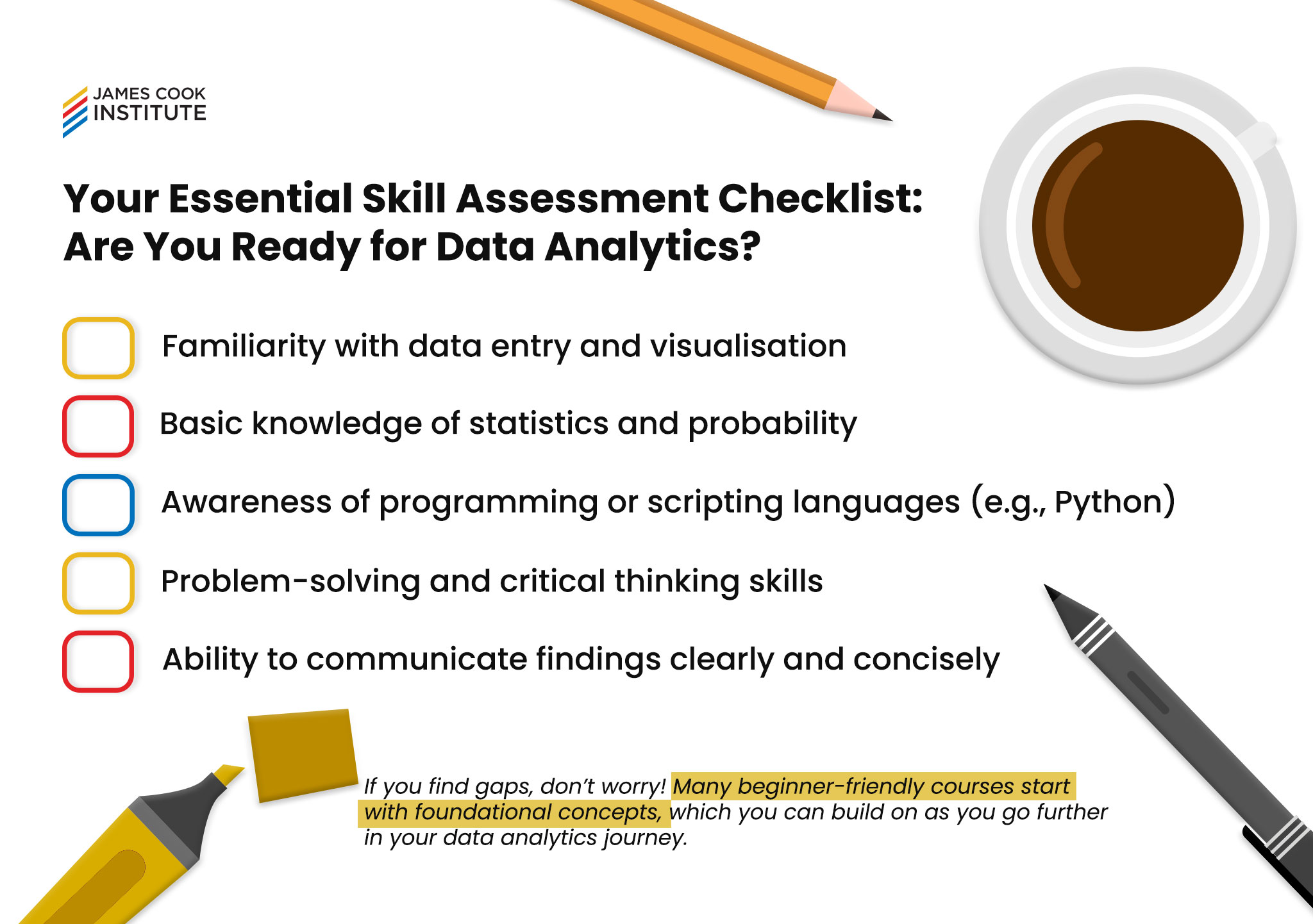Key takeaways:
- As businesses increasingly rely on data to power decision-making, professionals with data analytics skills remain in high demand across most industries.
- Data analytics helps organisations understand their past and present, as well as prepare for the future.
- Professionals looking to upskill in data analytics can choose courses based on content, flexibility, and certifications.
- Practising with real-world projects, building a professional portfolio, and networking with other professionals are some ways to get ahead in data analytics.
In today’s data-centric world, professionals equipped with data analytics skills can unlock new career opportunities, gain a competitive edge, and make strategic decisions that drive business success. This guide provides a clear, actionable roadmap to starting your journey in data analytics, whether you’re a complete beginner or looking to advance your expertise.
Why Data Analytics is a Must-Have Skill
Data analytics has become a cornerstone of modern business, powering decisions in industries ranging from finance and healthcare to retail and technology. It enables organisations to identify trends, optimise processes, and predict outcomes based on historical data. For professionals, mastering data analytics is no longer optional—it’s a strategic imperative if you want to level up in your career.
With more companies leaning on data, roles like data analysts and data scientists are among the fastest-growing professions globally. The U.S. Bureau of Labor Statistics says jobs for research analysts are predicted to increase by 23% from 2023 to 2033. In Singapore, the demand for these roles continues to rise as businesses adopt data-driven strategies. As such, now is the perfect time to upskill and position yourself as a valuable asset in the workforce.
Types of Data Analytics
Data analytics involves analysing datasets to uncover patterns, draw conclusions, and make informed decisions. It’s the backbone of effective decision-making across various domains, and there are four main types:
- Descriptive Analytics: Explains what has happened by analysing raw data. For example, you might look at a company’s data and determine that a product has more sales in the first half of the year than towards the end.
- Diagnostic Analytics: Identifies why something occurred, thus providing deeper insights into trends and anomalies. A diet meal plan, for instance, may be more popular in January because more people want to get back in shape after the holidays or live a healthier lifestyle as their New Year’s resolution.
- Predictive Analytics: Uses statistical models to predict future outcomes or trends. Looking at past years, e.g. subscription to meal plans spiking in January, you may be able to foresee what might happen in the coming years.
- Prescriptive Analytics: Suggests the best course of action based on data insights. From the diet meal plan example, how can the company capitalise on the trend? They may want to ramp up their marketing efforts during and after the holidays, or test a new market.
Each type plays a role in helping organisations understand their past, present, and future.
Assess Your Current Skills and Knowledge
Before jumping into a course, take stock of your current skills. Do you need to familiarise yourself with basic tools like Excel, or are you ready to dive into more complex platforms like SQL or Python? Next, look at the techniques you should master, such as data cleaning, visualisation, and statistical modelling. Understanding where you stand helps you choose the right starting point.

Choose the Right Data Analytics Course
After you’ve determined the skills you need to master, finding the right course is the next step. Are you looking to build a foundation or deepen your current knowledge? There are many courses available, ranging from beginner to advanced levels.
Consider these factors when choosing a course:
- Content: Look for a curriculum that covers core tools (Excel, Tableau, Power BI) and techniques like data cleaning and visualisation.
- Flexibility: Online data analytics courses allow professionals to upskill at their own pace.
- Certification: Programmes that provide recognised data analytics certification can elevate your credibility in the job market.
JCI Singapore offers a range of data analytics courses tailored to different experience levels, combining theoretical knowledge with hands-on applications to prepare you for real-world challenges.
Practice with Real-World Projects
Practical experience is the cornerstone of learning data analytics. Real-world projects reinforce your skills and provide tangible outcomes you can showcase to employers. Gain experience by working on case studies that simulate real business problems. Examples of beginner projects include analysing customer data to identify trends or creating dashboards to track sales performance. You may also explore open datasets that will allow you to test your knowledge.
Build a Professional Portfolio
A well-crafted portfolio is key to standing out in the job market. It demonstrates your ability to apply data analytics skills to real problems.
Here are a few elements you may include in your portfolio:
- Project Summaries: Briefly describe the datasets you analysed and the insights you derived. When applicable, include the impact your analysis had on, say, a business decision or even a change in strategy.
- Visualisations: Add screenshots of dashboards or charts created using Tableau or Power BI.
- Certifications: Highlight relevant courses and data analytics certifications you’ve earned.
- Upload your portfolio to LinkedIn or other relevant online platforms to increase its visibility and establish your credibility.
Expand Your Professional Network
Networking is an integral aspect of career growth in data analytics. It keeps you informed about industry trends, tools, and opportunities.
Below are some ways you can network:
- Attend Industry Events: Conferences and workshops offer valuable insights and connections.
- Join Online Communities: Participate in discussions on Reddit forums or LinkedIn groups.
- Connect with Alumni: Reach out to past participants of data analytics courses to learn from their experiences.
In addition, building relationships within the industry can lead to mentorship opportunities and job referrals.

Plan for Continuous Learning
The field of data analytics is always evolving, with new tools and methodologies emerging regularly. As such, staying relevant requires ongoing education.
Here’s how to stay updated:
- Advanced Courses: Explore certifications in specialised areas like machine learning or big data.
- Follow Thought Leaders: Keep track of industry experts through blogs and social media.
- Experiment with New Tools: Regularly test emerging technologies to expand your skill set.
By committing to continuous learning, you ensure long-term career growth in this dynamic field.
Take Your First Step with JCI Today
Starting your data analytics journey can feel overwhelming, but by following these steps—assessing your skills, choosing the right course, practising with real-world projects, and continuously learning—you can build a successful career in this high-demand field.
JCI Singapore’s range of data analytics courses is designed to guide you every step of the way. Whether you’re just starting or looking to deepen your expertise, our hands-on programmes provide the tools and knowledge needed to excel. Take the first step toward your data-driven future today.
Join Our Data
Analytics Course Today-Get
Started Now!
Elevate your career with JCI’s WSQ-certified data analytics courses, Master Excel, Power BI, and data visualization at your own pace.
Your future in data analytics awaits!





